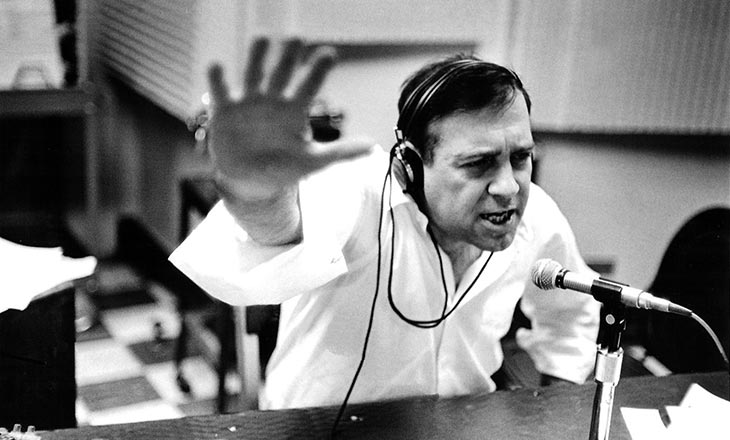I watch twenty-four hours of A Christmas Story every Christmas. I saw it for the first time when I was a young, maybe eleven or twelve. I understood that the narrator was commenting on his childhood experience from an ironic distance but I was young enough to relate to those childhood experiences: school work, dares, and bullies. The narrator had a way of imbuing each event in the movie – the Scut Farcus affair, the lamp, the Little Orphan Annie decoder pin – with importance and humor. The narrator’s name is Jean Shepherd.
I only knew him as the narrator of A Christmas Story and, frankly, if that’s all I ever knew him as, that would have been enough. But it turns out he was also an influential radio personality in New York in the fifties. He wrote stories for Playboy that would later be collected into the short story collection slash novel In God We Trust All Others Pay Cash that would inspire A Christmas Story. He was a contemporary (and resenter) of Mort Sahl and Lenny Bruce and a friend of Shel Silverstein. Known as Shep to his friends and admirers, his given name was Jean, the woman’s name. It’s speculated that Silverstein got the idea for “A Boy Named Sue” from Shepherd’s name.
His radio broadcasts were on late which seems to have informed the experience of many of his listeners. The prototypical Jean Shepherd fan story usually mentions said fan, as an adolescent, in his or her room, listening to the radio under the covers, after hours. It was this illicit listening along with Shepherd’s style of making each listener think that he was talking directly to them that inspired such devotion. I feel like I had a similar experience watching the MTV sketch comedy show The State in high school. While it was on during normal hours, it still felt somewhat underground, unknown to parents or the mainstream, and when I met someone who knew The State, I knew that that person got it.
This is what I gather, anyway, after reading Excelsior, You Fathead!: The Art and Enigma of Jean Shepherd by Eugene B. Bergmann. The book didn’t tell me much that I didn’t already know. Bergmann himself seems to be one of those teenaged fans for whom Shepherd was so important, which makes the book somewhat disappointing. Bergmann transcribed and printed many of Shepherd’s broadcasts to try to give the reader the experience of listening to Shepherd. I wanted more, though. I wanted more about the I, Libertine hoax in which listeners were encouraged to ask bookstores for the fictional best seller. When asked, “who publishes it?” you were instructed to shout, “Excelsior, you fathead!” hence the name of the book. The gag became so popular that Shepherd eventually co-authored an actual I, Libertine book under the name Theodore Sturgeon. How did Shepherd achieve his popularity? How did he get to the point where they gave him a radio program where he could just talk without playing any music? Bergmann seems to take for granted that you already get Shepherd, so he spends much of the book giving examples of the themes that were consistent throughout Shepherd’s work, rather than giving us a biographical timeline.
To be fair, though, that would have been difficult. Shepherd was paradoxical in that he seems to have been completely self absorbed and yet never forthcoming with any real details about his life. We know he grew up on the south side of Chicago and in Indiana, had a brother Randy, and attended a school named after Warren G. Harding. We know he was in the army. We know he was married four times and abandoned his first family (going so far as to deny the existence of his children at his death). The rest of it, though? Who knows? Did he know people named Flick or Schwartz? Did any of the events described in In God We Trust or A Christmas Story ever take place? Sometimes he says yes, later in life he says no. Shepherd, it would appear, was a burner of bridges. After being fired from his radio show, he disavowed radio. He started doing Jean Shepherd’s America on television. But when he got the chance to start doing movies, he disavowed television.
The ways in which he was an asshole are not surprising if you’ve ever read about any influential artist. He was, by most accounts, incredibly self centered, always talking at length about himself. He was difficult with the radio engineers. He resented the advertisements he had to do for sponsors, often making fun of them on the air. He was completely uncompromising and consumed by jealousy of his more successful peers – a nice little cocktail that lead to some serious bitterness late in life.
But he created hours and hours of material that meant a lot to people even if no one can accurately convey to me just why. There are literally thousands of forty-five minute broadcasts (you can listen to some on youtube). He was the precursor to the likes of Imus and Stern and, were he around today, could reach legions of new fans with a podcast. He also hated Garrison Keillor’s Prairie Home Companion and The Wonder Years for stealing heavily from his homespun style of storytelling and comedic narration of childhood respectively. The more I’ve thought about it, the more I think he has a point, especially with regards to The Wonder Years.
I was reading Excelsior, You Fathead! on the subway and an older gentleman across from me, carrying some instruments thus giving him a hipster air stopped me as we got off at Atlantic. “Oh man, I used to listen to that guy in the fifties.” He said it was a real fondness. It seems that if Shepherd meant anything to you at all, he meant a lot.





I much enjoyed your extensive description of Jean Shepherd (Though I rather disliked what I feel are your innacurate/negative feelings about my EXCELSIOR, YOU FATHEAD!) . By the way, he did not write I, LIBERTINE under the name Theodore Sturgeon. Sturgeon was a well-known and highly-regarded science fiction author who wrote most of the book along with Shepherd’s input. The fictional author of I, LIBERTINE is Frederick R. Ewing.
As you may be aware, I make it clear in the book that it’s not a biography (despite what my publisher and others’ claim.) It’s a consideration, description, and appreciation of Shepherd using a rough chronological format.
I’m also the transcriber, editor, commentator of the published book SHEP’S ARMY–BUMMERS, BLISTERS, AND BOONDOGGLES (foreword by Keith Olbermann Opus Books, 2013.) Also see my blogsite http://www.shepquest.wordpress.com, in which I’ve written hundreds of illustrated essays about Shep, etc (plus essays on various arts in which I’ve been involved, under the title ARTSY FARTSY.
Excelsior, You Fathead!
Eugene B. Bergmann
Hey Eugene, thanks for reading and thanks for commenting. I hadn’t remembered this post as I had written it years ago but I guess I was a little negative about your book. I apologize. I suppose it was marketed as a biography but it did read more like an appreciation of his work. I’ll check out your blog! Take care – Rob. (P.S. how did you find this post?)
Hi, Rob,
You should also check out the major website devoted to Shep, Jim Clavin’s http://www.fliccklives.com Finding your website this morning I put in , I believe, Jean Shepherd Shel Silverstein, and up poppe3d your website riference!. By the way, my blog pages include so many essays transcribing his travels and so many essay transcribing his kid stories not elsewhere in print, that both should (IMHO) published as books, but I haven’t found a publisher.
cheers,
Gene